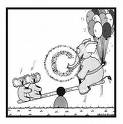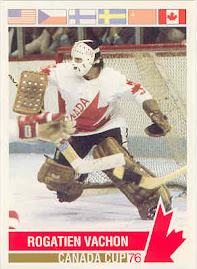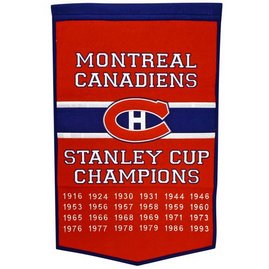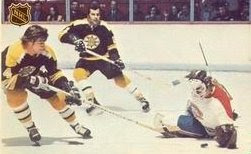
There is currently much debate going on in NHL circles having much to do with balanced schedules. Certain teams are citing a desire for less games versus divisional rivals and more games against traditional opponants. Teams are also crying foul over the obscenity of seeing the likes of Sidney Crosby and Alexander Ovechkin in their buildings only every once in three years.
While both those claims need imperative fixes, another blasphemy on hockey is occurring - the senselessness of games on back to back nights!
This travesty robs hockey of it's purest goal - to entertain!
As any professional player will attest, hockey, with it's accents on speed and body contact, is in essense the most physical of sports. Demanding that players reach peak levels on a nightly basis is key to its entertainment value. Having players play two games within 24 hours of each other diminishes the possibility of the spectacle reaching its highest of heights.
Unless you subscribe to the notion that bad hockey creates its own excitement, the idea of back to back games is hardly appealing.
Imagine that you have laid down your hundred bucks while waiting a month to catch a favorite player appearing in your city and he shows up tired and flat from playing the night before. Imagine you finally get a hold of primo seats to catch the hometeam of your choice and they are dying halfway through the contest from having just come off the road 24 hours ago.
This is not selling the game at its very best.
The NHL heads will roll the obligatory travel expense / arena booking / jammed schedule excuse, as usual. I say it's a bunch of narrow thinking refried balony. It's fixable if they want to. The benefits ought to be obvious, especially to businessmen only looking at greenbacks.
Simply put, a better quality game will surely lead to more cheeks in seats.
Proof that back to back games are a detriment to fair play, predictability, and excitement, is not hard to find. Doing reasearch over the last ten games of the current schedule, I found shocking and revealing results.
From November 16th, back to November 6th, an 11 day span, there were 17 instances of teams hitting the ice on consecutive nights. 13 of those, a whopping 83% ended in losses.
Below are the games in question. The result in brackets signify the second of two games whereas non bracket scores are the previous nights result
16th
Fla 5 Mon 1 (Mon L)
Min 7 Nas 6 (Nas L)
15th
Nas 5 CBJ 4
Mon 3 TB 1
13th
Edm 2 Col 1 (Edm W)
12th
STL 5 Edm 3
Ana 3 Min 2 (Min L)
11th
Bos 4 Ott 3 (Ott L)
Buf 5 Phi 4 (Buf W)
Was 3 NYR 1 (NYR L)
Car 6 Pit 2 (Pit L)
NJ 4 Fla 2 (Fla L)
TB 5 Atl 3 (Atl L)
Nas 1 Col 0 (Nas W)
Cal 3 Van 2 (Cal W)
Min 3 LA 2
10th
Edm 4 CBJ 1 (CBJ L)
Ott 6 Pit 3
NYR 4 Atl 2 *
Det 3 Nas 0
Buf 5 Fla 4 *
Chi 3 STL 1 (STL L)
Cal 3 Ana 0 (Ana L)
9th
CBJ 4 STL 2 *
Ana 6 Van 0
8th
Det 3 Edm 0 (Edm L)
7th
Mon 3 Edm 2
Cal 3 Dal 1 (Dal L)
6th
Van 2 Dal 1
Some points to make on these stats.
- Of the four teams who managed wins, three of them ( Cal, Buf, Nas ) are hot and ought to have been expected to win.
- Six of the 13 losing teams lost games they would have normally been favored to win.
- Games marked by asterics note two teams who both played the following night. One is inevitably destined to lose.
- Of the 13 teams losing, 9 currently have .500 or better records.
- Six of the 13 losers, also lost the previous game.
I offer these stats, as the devils's advocate to the argument, to point out that winning teams win, while losing teams continue to lose - theoretically. As these figures make clear, such instances hold true only 50% of the time in back to back games. While close to 20 of the leagues 30 teams are playing what appears to be .500 hockey (thanks in no small part to points awarded for what is essentially losses), these findings would tend to suggest a good many of these losses can be found in situations of back to back games.
The NHL always rhetorics that the number of back to back games evens out per team over a seasons course. A handy spin, but that's hardly the point!
Fans want fairness in the spectacle and the outcome decided by factors having nothing to do with scheduling.
When 83% of these games are lost, the argument makes its own point.
We often decry the athlete who does not give their "all". Little do we understand that many times, giving it everything they have ends 7 minutes into the second period.
"Yes, but they are professionals, and ticket prices being what they are, they should..."
Trust me, even the most finely tuned of physical specimens have limitations. Yes, the Rocket, Gordie, and the Golden Jet were hardly ever flat. Their schedules didn't consist of 82 games either. The time frame reference doesn't hold up anymore, but we have still based our hockey ethics and values on these notions we were raised with.
The thinking must now change to allow our best to be the best on a nightly basis.
Come mid - December, I may crank out this method again, for consistencies sake. I doubt the findings will alter much.




























































































































































No comments:
Post a Comment